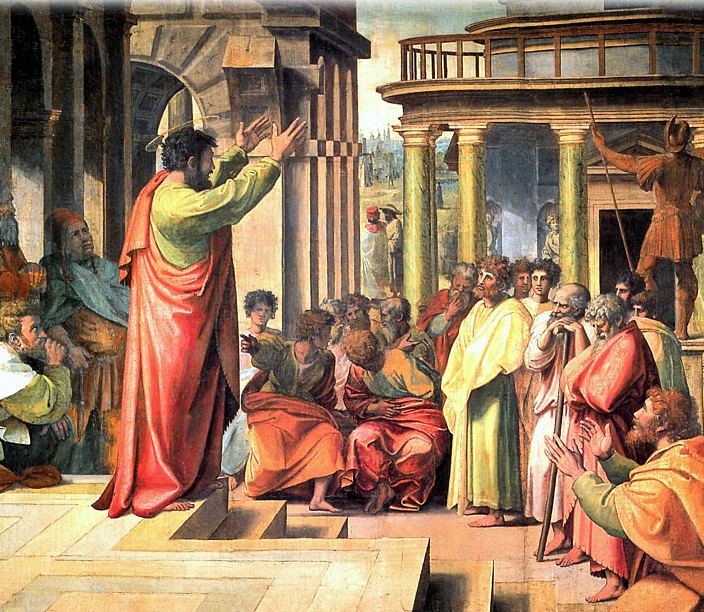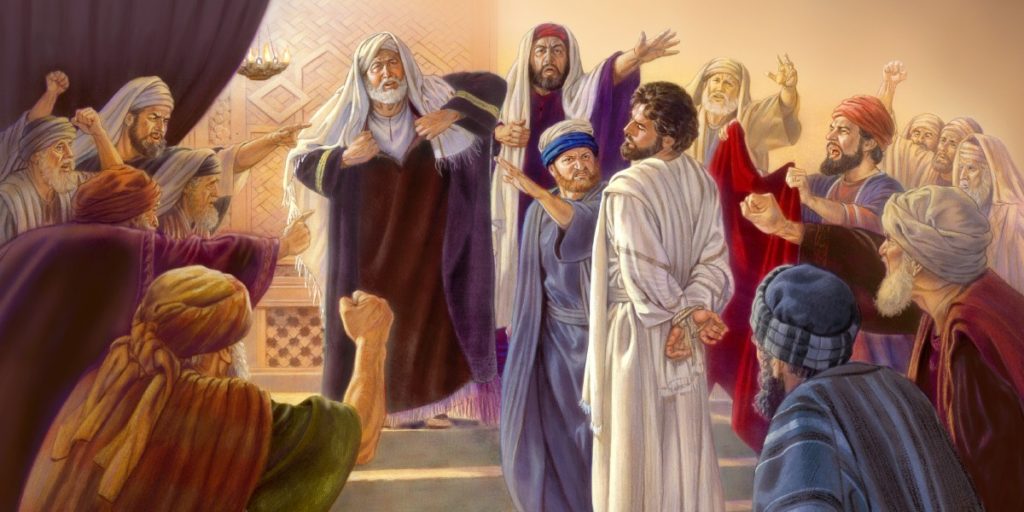Contrast #18: for strangers vs to friends … (09/26/18)
It makes easy sense that relatively cowardly individuals with low self-esteem (see Contrast #09 on page 29 and Contrast #14 on page 34) would tend to gravitate towards speaking to gatherings of people who are either already well-known &/or who are likely to accept whatever is being sold or shared. And this is precisely what we see Paul doing throughout his ministry – traveling to &/or writing to the “believers” in already-established churches (see Acts 13:1, Acts 14:20-28, Acts 15:3-4, Acts 15:30-35, Acts 15:41, Acts 18:22-23, Act 20:2-3, Acts 20:17, Acts 21:7, Acts 21:15-17, & Acts 28:14-15 – also Acts 15:36‘s “Come, let us return and visit the believers in every city where we [have already] proclaimed the word of the Lord” and, of course, the biblical epistles Paul penned to the congregations in Rome, Corinth, Galatia, Philippi, Colossae & Thessalonica) &/or entering and preaching in pre-established synagogues1 (see Acts 9:20, Acts 13:5, Acts 13:14-16, Acts 14:1, Acts 17:1-2, Acts 17:10, Acts 17:17, Acts 18:4, Acts 18:19, & Acts 19:8 – and this despite Paul’s proclamation that he had been “entrusted with the gospel for the uncircumcised” in Galatians 2:7). Paul also goes out of his way to laud those of like mind &/or like faith (see Acts 13:17, Romans 1:6-7, Romans 3:22, Romans 4:13, Romans 8:1, Romans 8:27-30, 1 Corinthians 1:2, Galatians 1:15, Galatians 6:10, Philippians 1:3-5, Philippians 2:15, Colossians 1:12, Colossians 1:26-28, 1 Thessalonians 3:11-13, 1 Thessalonians 4:9-10, & 1 Thessalonians 5:2-5), to denigrate those who believe differently than he does &/or who aren’t in his comfortable circle of friends (see Romans 1:18-21, Romans 1:28-32, Romans 10:2-3, Romans 16:17-18, 1 Corinthians 2:14, 1 Corinthians 5:9-13, 1 Corinthians 6:9-10, 2 Corinthians 6:14, 2 Corinthians 11:4-15, Galatians 1:6-9, Galatians 3:1-3, Galatians 4:30-31, Galatians 4:10-12, Philippians 3:2, Philippians 3:17, Colossians 2:8, Colossians 3:5-6, & 1 Thessalonians 2:14-15), and to coddle or bow down to those who had political power &/or influence (see Acts 16:40, Acts 18:1-4, Acts 18:7-8, Acts 20:3-4, Acts 22:25-28, Acts 23:5, Acts 23:16-32, Acts 24:22-23, Acts 25:10-11, Acts 27:3, & Acts 28:16 – also his admonition in Romans 13:1-2 to “Let every person be subject to the governing authorities; for there is no authority except from God, and those authorities that exist have been instituted by God. Therefore whoever resists authority resists what God has appointed, and those who resist will incur judgment”) …

Jesus Christ, on the other hand, maintained a very different style of affiliating with others. First & foremost, while he did (like Paul) enter local synagogues to teach there, he spent the vast majority of his ministry teaching to crowds of strangers – crowds not that he had sought out, but rather who had thronged to him (see Matthew 4:25, the Sermon on the Mount in Matthew 5-7, Matthew 8:1-5, Matthew 8:18, Matthew 9:9, Matthew 9:27-32, Matthew 11:7, Matthew 12:15, Matthew 13:1-3, Matthew 14:13, Matthew 14:34-36, Matthew 15:10, Matthew 15:30, Matthew 19:2, Matthew 19:16, Matthew 20:29, Mark 1:32-33, Mark 2:1-2, Mark 2:13, Mark 3:7-8, Mark 3:20, Mark 4:1, Mark 5:21-24, Mark 6:33-34, Mark 6:54-55, Mark 7:24, Mark 8:1, Mark 8:22, Mark 9:15, Mark 10:1, Mark 10:13-17, Mark 10:46, Luke 4:42, Luke 5:1-3, Luke 5:11, Luke 5:15-19, Luke 6:17-18, Luke 7:11, Luke 8:4, Luke 8:40, Luke 9:11, Luke 9:37, Luke 12:1, Luke 14:25, Luke 15:1-2, Luke 17:11-12, Luke 18:15, John 4:45, John 6:2-5, John 6:24-25, John 10:41, & John 12:9-12). Secondly, it is important to note that Jesus did not limit his interactions to those with whom he felt comfortable, but regularly and willingly associated with the meek and the downtrodden and the “undesirable” and the “unclean” – embracing lepers (see Matthew 8:3, Mark 1:41, & Luke 5:13), being kind to centurions (see Matthew 8:5-13 & Luke 7:1-9), forgiving prostitutes (see Luke 7:37-50 & John 8:3-11), honoring Samaritans (see Luke 17:11-19 & John 4:7-40 – also Acts 1:8 & Luke 10:29-37), dining with Pharisees (see Luke 7:36, Luke 11:37-54, & Luke 14), and openly associating with “tax collectors and sinners” (see Matthew 9:10-12, Luke 15:1-3, & Luke 19:1-10). Finally, Jesus refused to bend to pressures from political authorities; never appealing to their mercy, but rather answering their charges with either cryptic wisdom (see Matthew 26:63-64, Matthew 27:11, Mark 15:2, Mark 14:61-62, & John 18:6) or unwavering silence (see Matthew 26:62, Matthew 27:12-14, Mark 15:3-5, Luke 23:9, & John 19:9).

“Paul would have done well to often ask himself: What would Jesus not have written – What would Jesus not have done? … How fortunate we are that, despite this grave undersight, every day more and more people are waking up; that every day more and more are walking away from the church of Paul and heading back to the God of Christ.” ~ inspired by Chuck Palahnuik & Lenny Bruce
………………………………………………………………..
1While it is admittedly true that Paul’s self-made theology was not welcomed in the majority of the synagogues he visited, it is just as true that Paul was obviously well-versed in Jewish Law and felt quite comfortable arguing about the same in those particular arenas.




 ;
;